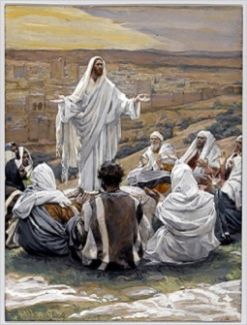 One of the beautiful things about our Faith is that pretty much everything we say and do is full of meaning, symbolism, and significance. One of the challenging things about our Faith is that — yes — pretty much everything we say and do is full of meaning, symbolism, and significance.
One of the beautiful things about our Faith is that pretty much everything we say and do is full of meaning, symbolism, and significance. One of the challenging things about our Faith is that — yes — pretty much everything we say and do is full of meaning, symbolism, and significance.
The challenge is not unlike receiving a boatload of amazing presents at an overly generous birthday party. You simply can’t absorb and appreciate them all in the timeframe that they’re presented: Oh, wow! A new silver bicycle I’ve always wanted, and the latest video-game system that looks amazingly fun, and a dazzling white laptop computer that will be super-useful, and the exact black puppy I’ve always dreamed of, and . . . who can remember the bicycle? (What color was it?)
So, when we’re presented with something we know well, it’s all too easy to think of it in terms of the whole, ignoring the individual elements that have their own wisdom to dispense.
Today’s Gospel selection from Luke offers to us a form of the Lord’s Prayer, the full version of which is probably so familiar that we may have a hard time focusing on the Scripture, because the mind’s tendency to go, “Yep! I know this one!” kicks in and we tune it out. (After all, if you hear this gospel reading at Mass, you’ll hear a version of this exact prayer in a few minutes!)
But not only is this version a bit different — shorter than the one we’re most familiar with — it’s also different in a couple of subtle ways.
And, in this case, its shortness can work to our advantage.
Jesus’ disciples asked, “Lord, teach us to pray just as John taught his disciples.” And it’s one of the relatively uncommon times when Jesus does exactly what they asked, without parable or preamble. He thus thought the words and ideas themselves were accessible enough to his disciples that they didn’t require any additional teaching; I suspect that Jesus intended this prayer to serve as a way for the Spirit to work with His followers, allowing them to get as much out of the prayer as they were willing to put in.
So let’s do that.
Looking at the Lord’s Prayer as presented today, it’s six lines. As an exercise, consider printing them out, and reflecting on one line a day . . . and just that line, ignoring any surrounding verbiage. (At six lines, it might make a good process Monday through Saturday, perhaps letting you go into Sunday’s Mass with new insight.)
Jesus said to them, “When you pray, say . . .”
• Father, hallowed be your name – What does the intrinsic holiness of the Lord mean to you? To the world? How much do you understand and appreciate that the Lord is both the epitome of holiness, yet “personal” enough that Jesus came to Earth? That we are encouraged to have a direct relationship with God?
• your Kingdom come. – What does the Lord’s Kingdom mean to you? Can you envision it? Can you envision working to bring it to Earth, as you work to bring yourself closer to the perfect Kingdom of Heaven?
• Give us each day our daily bread – To what extent do you trust in the Lord to supply what you need? Do you appreciate the countless blessings that encircle your life?
• and forgive us our sins – How much hold does sin have over you? Have you worked with God to be the person He wants you to be? How much does the idea of “forgiveness” mean to you? When is the last time you partook of the Sacrament of Reconciliation?
• for we ourselves forgive everyone in debt to us, – How much have you forgiven others? Have you lived your life giving the Lord’s bounty with which you’ve been blessed to those in need, without necessarily thinking of being repaid? How much of your life is spent living, and how much is spent bookkeeping past slights, debts owed, and attachments to meaningless mortal matters?
• and do not subject us to the final test. – How much do you think about the end of your life? If you needed to explain yourself to God, what would you say was the greatest thing you did for Him? What would you tell Him was your greatest failing or failure? If that failing is ongoing, is there a way to address it now, while there’s time . . . or are you just hoping for the best at your one shot at Heaven?
The Lord’s Prayer is how Jesus specifically taught his disciples to pray, to get closer to God and their own connection with Him. If you’ve found yourself blazing through this Scripture and the countless times you’ve no doubt heard the Lord’s Prayer, consider taking a handful of days and really reflect on it. It may well bring you closer to God, as Jesus intended.
